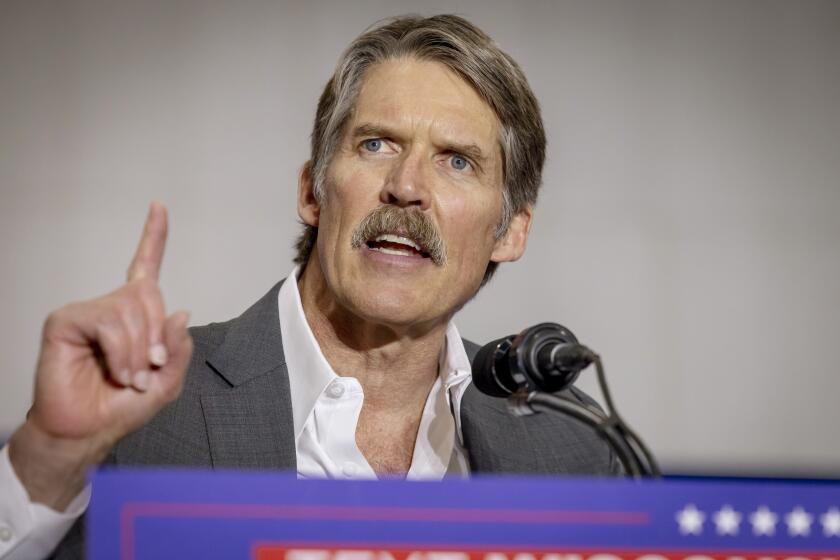Record Borrowing for Budget Expected : Legislature: Democrats and Republicans alike want to adopt a plan this week to avoid another 1992-style impasse. Unique political dynamics, deficit complicate this year’s situation.
With the start of the next fiscal year only days away, legislators and Gov. Pete Wilson will try this week to adopt an election-year budget that is almost certain to be propped up by the biggest borrowing in the state’s history.
Still smarting from a public relations drubbing they took two years ago, when the state went 64 days without a budget and paid its bills with IOUs, the Republican governor and the Democrats who control the Legislature seem to want nothing more than to get a budget--any budget--done on time.
Despite their partisan differences, Democratic and Republican budget negotiators have agreed on some basics: funding for public schools, higher education and local government. They are near an accord on how much to boost spending for the state’s fast-growing prison system.
Still in dispute is how deeply to cut welfare grants--a reduction of some kind is inevitable--and the fate of two tax issues, one that affects the poor and one of concern to the state’s wealthiest residents.
No matter how these issues are resolved, the eventual budget is expected to rely on a record $7 billion in borrowing over the next two years.
The political dynamics at play in this year’s negotiations are unique.
With the Republican governor and 100 of the 120 seats in the Legislature on the ballot in November, the aim of most of those in the Capitol is to have a budget in place by Friday, the first day of the next fiscal year.
Yet the state’s two top fiscal officers--Treasurer Kathleen Brown and Controller Gray Davis--are the Democratic nominees for governor and lieutenant governor and have not been as willing as their colleagues in the Legislature to accept some of Wilson’s assumptions.
Wilson has proposed a two-year deficit financing plan that anticipates the receipt of $763 million this year and $2.8 billion next year from the federal government for the cost of providing services to illegal immigrants.
Few Democratic legislators believe these estimates are realistic. They are willing to go along with Wilson because plugging those numbers into the budget spares them from having to raise taxes or make more painful spending cuts. They can simply postpone the day of reckoning for another year.
Brown, in contrast, wants to restructure the state’s debt into a five-year note, which she would repay by cutting services and raising taxes. So far, her proposal has been all but ignored.
Davis can block Wilson’s proposed borrowing if he is not satisfied the state will have the cash on hand in two years to repay the debt, and he has said Wilson’s hope for a $2.8-billion bailout from the federal government is unrealistic.
As a result, he has demanded that legislators and the governor adopt a stand-by mechanism that would prompt budget cuts or tax increases if the state’s cash runs behind projections.
Under the plan, the controller could declare a cash shortage at certain points between now and mid-1996. If the controller did so, the governor would be required to propose a plan to fix the problem. If the Legislature failed to adopt the governor’s plan or an alternative, across-the-board reductions would be triggered in every program not protected by the state Constitution or federal law.
The Assembly has scheduled a vote on the budget for Monday but the tally is expected to produce no more than a partisan showdown, with Republicans voting against it.
Assemblyman John Vasconcellos, the Democratic chairman of the budget-writing Ways and Means Committee, said the Republicans’ opposition to higher taxes is jeopardizing basic services on which Californians depend.
“If we don’t begin to understand, the public and all of us, how much the most precious institutions of education and health care are at risk at this point in time, then we all ought to forsake any notion of California ever again being a decent place to live, work or study,” Vasconcellos said.
But a spokesman for Assembly Republican Leader Jim Brulte said few of Vasconcellos’ fellow Democrats support higher taxes. He predicted that negotiations would continue even amid partisan posturing and that a final product that is acceptable to the required two-thirds of the members would be complete by week’s end.
“Traditionally the Democrats have always proposed a budget that they would wish for but which the Republicans cannot support,” said Phil Perry, Brulte’s press secretary. “But after these budgets go down to defeat the negotiations continue and real progress can be made.”
So far, the negotiators have agreed to give elementary and secondary schools enough money to keep up with enrollment, though they will still lose ground to inflation.
Community colleges, meanwhile, would get an increase of about 4%. The governor wants to boost fees from $13 per unit to $20, but so far has met resistance in the Legislature.
Higher education is in line for modest increases. The University of California will get a 2% increase, while the California State University system seems set to receive a 3.2% boost. Both systems plan to increase student fees by 10%.
For local government, lawmakers are set to approve Wilson’s proposal to shift $500 million in property tax revenues away from the counties. This is money the state tried to take a year ago. But because of a quirk in the law, the counties were able to avoid doing what the Legislature thought it had ordered.
The state also appears ready to take $285 million away from county health programs--another Wilson proposal. This cut is expected to force further reductions in services to the poor.
On prisons, Wilson proposed an increase of about 10% to handle the rising population of inmates. Democrats had hoped to cut that growth in half but may give the governor what he wants because Brown, the Democratic nominee, has endorsed Wilson’s figure.
The situation on welfare is similar. Wilson wants to reduce grants 10% immediately and another 15% after six months for able-bodied adults still on the rolls. The combined reduction would leave a mother and two children with a monthly cash grant of $464. They currently receive $607 each month.
Democrats were insisting on no reduction in the grant, which has already dropped nearly $100 since Wilson took office. But Brown, in her own budget proposal, called for a 5% cut, making it more difficult for Democratic legislators to maintain their opposition.
The other major dispute is over taxes.
Republicans want to eliminate the $60 renters tax credit, which has been suspended for two years but is scheduled to come back on the books in 1995. Democrats would like to preserve the credit, which goes mostly to low-income tenants.
Democrats, meanwhile, want to maintain a temporary surcharge on personal income taxes paid by the wealthy. The surcharge, enacted in 1991 and scheduled to expire at the end of 1995, boosts the top rate from 9.3% to 10% or 11%. The 10% rate applies to incomes over about $100,000, while the 11% rate affects individuals earning more than about $200,000.
More to Read
Get the L.A. Times Politics newsletter
Deeply reported insights into legislation, politics and policy from Sacramento, Washington and beyond. In your inbox three times per week.
You may occasionally receive promotional content from the Los Angeles Times.





